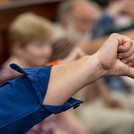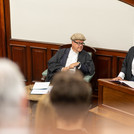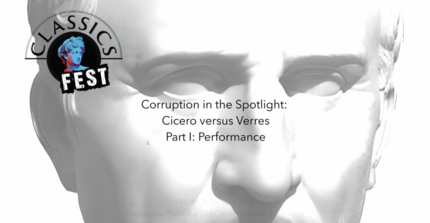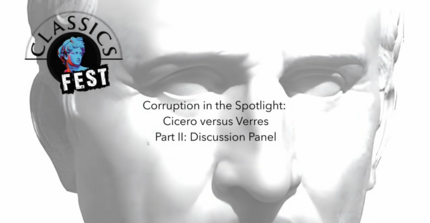Podcast Series
In the Twisted Transfer podcast series (TwiTraPod), leading scholars present different approaches, methods and facets of research on corruption throughout history. Stay tuned and be informed here and on social media as soon as a new episode is released.
Lecture Series Corruption in Antiquity
The Podcast of the Lecture Series "Corruption in Antiquity" (Potsdam, summer 2022) can be found here.
Introduction to TwiTra
The first video of our series deals with the the research project "'Twisted Transfers': Discursive Constructions of Corruption in Ancient Greece and Rome". What are the project's goals? And what are the differences between gifts and twisted gifts? These and many other questions will be answered in this short introduction.
Lecture by Ronald Kroeze
Due to the Corona pandemic, the second project workshop had to take place online. Here you can find the evening lecture by Prof Kroeze (Vrije Universiteit Amsterdam) as a video.
Twisted Transfers Panel at ESSHC 2021
Das Twisted Transfers Projekt veranstaltete am 23.04.21 ein gemeinsames Panel auf der European Social Science Conference (ESSHC) in Leiden. Unter dem Titel "Discursive Constructions of Corruption in Ancient Rome" fand nachfolgendes Vortragsprogramm statt, das Sie hier "nachschauen" können. Die Angaben in den Klammern bezieht sich auf den jeweiligen Beginn des Vortrages im Video in Minuten.
Neville Morley (Chair)
Filippo Carlà-Uhink: “He had thoughtlessly accepted certain Gifts”: Corruption and Normative Behavior for Roman Magistrates (2.33).
Marta García Morcillo: Financial Complexity, Immoral Behaviour and the Discourse of Corruption in Roman Mentality (19.45).
Sema Karataş: Competition, Contention and Corruption: the Trial of Cn. Plancius in 54 BCE (32.50).
Christian Rollinger: Dazzling the Barbarians: Diplomatic Gifts during the High and Late Empire (48.00).
Questions and answers (1.01.41).
Lecture by Lucy Koechlin
Lecture by Lucy Koechlin (Basel): Corruption as social practice: an interpretive approach.
Lecture by Elizabeth David-Barrett
Public Lecture by Professor Elizabeth David-Barrett (University of Sussex, Director of the Centre for the Study of Corruption): Re-thinking State Capture and its Impact on Inequality - key lecture during the fourth online workshop of the research group "Twisted Transfers" (Potsdam-Roehampton).
Lecture by Andrew Sanchez
Public Lecture by Dr. Andrew Sanchez (Associate Professor in Social Anthropology – University of Cambridge): Systemic Criminality and Capitalism (15.12.2022).
Vortrag von Prof. Dr. Carlà-Uhink: Korruption und Korruptionsbekämpfung in der athenischen Demokratie
Lecture by Filippo Carlà-Uhink at the University of Hamburg. CISAL Lecture Series 2022/23: New Research in the History of Ancient Law.
41. Wissenschaftlicher Salon | Vortrag von Prof. Dr. Filippo Carlà-Uhink: Korruption in der Antike
02. Juli 2025 | 18.00 - 19.30 | Wissenschaftsetage im Bildungsforum, Am Kanal 47, 14467 Potsdam
Dürfen Menschen in politischer Verantwortung Geschenke annehmen? Wenn ja, von wem? Wird eine Gegenleistung erwartet? Wo verläuft die Grenze zur Bestechung? Prof. Dr. Filippo Carlà-Uhink, Professur für Geschichte des Altertums an der Universität Potsdam, versucht etwas mehr Klarheit zu schaffen und schaut dafür sehr weit zurück: in die römische Antike. In seinem Vortrag berichtete er darüber, wie man über „korruptes Verhalten“ in den antiken politischen, kulturellen und wirtschaftlichen Kontexten gesprochen hat. Welche normativen Werte prägten das Zusammenleben? Was galt als Ideal richtigen Verhaltens? Was war gesellschaftlich akzeptiert, was nicht? Skizzierte Fallstudien helfen verstehen, welche Handlungen als Akte der Korruption dargestellt werden konnten – und bis heute werden.
ClassicsFest 2025 | Corruption In The Spotlight: Cicero versus Verres
On May 16, 2025, the Lit & Phil, the historical library in Newcastle upon Tyne, England, hosted a performance entitled “Corruption In The Spotlight: Cicero versus Verres”, written by Kirsten Luckins, as part of ClassicsFest 2025: Why Cicero Matters, a collaboration between the Lit & Phil and the School of History, Classics & Archaeology at Newcastle University. The idea for the theatrical production and the new perspective on the defense in this still-famous corruption and extortion trial of Gaius Verres, the former governor of Sicily, arose during several seminars conducted by Dr. Marta García Morcillo and Dr. Nick Freer from the School of History, Classics, and Archaeology at Newcastle University and the Twisted Transfers project in collaboration with students. Following the performance, a panel discussion took place in front of a large audience between Dr. Marta García Morcillo, Kirsten Luckins, Dr. Kathryn Tempest, Dr. Laura E Hope, and students involved in the project.
Fake news, tax fraud and bribery – not today’s headlines but those of ancient Rome. Join us in exploring the roots of political corruption by looking at the Roman Magistrate Gaius Verres, whom Cicero famously put on trial (70 BC) for offences including spreading fake news. With contributions from sixth form students across the region, writer Kirsten Luckins reimagines the trial and puts a spotlight on its contemporary parallels. Performed by Wambui Hardcastle and Eilís Konstantina and presided over by Prof. Deveral Capps, Dean of Leeds Law School. This is a collaboration with Classics for All, Newcastle and Durham Universities and the Lit & Phil.
The project was made possible through a collaboration with Classics for All North at Durham University. For more information about the performance and the actors, please visit the Lit & Phil website here. The following photos provide a small impression of the event.
In addition, both parts of the event were recorded. You can find them below and on the Lit & Phil YouTube channel.











